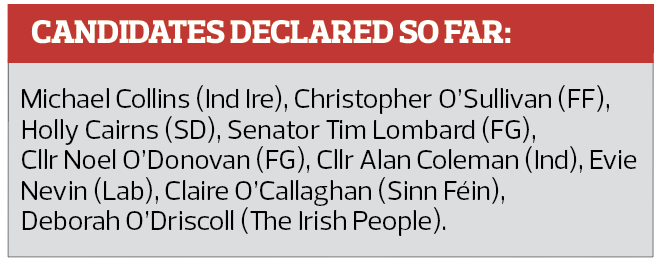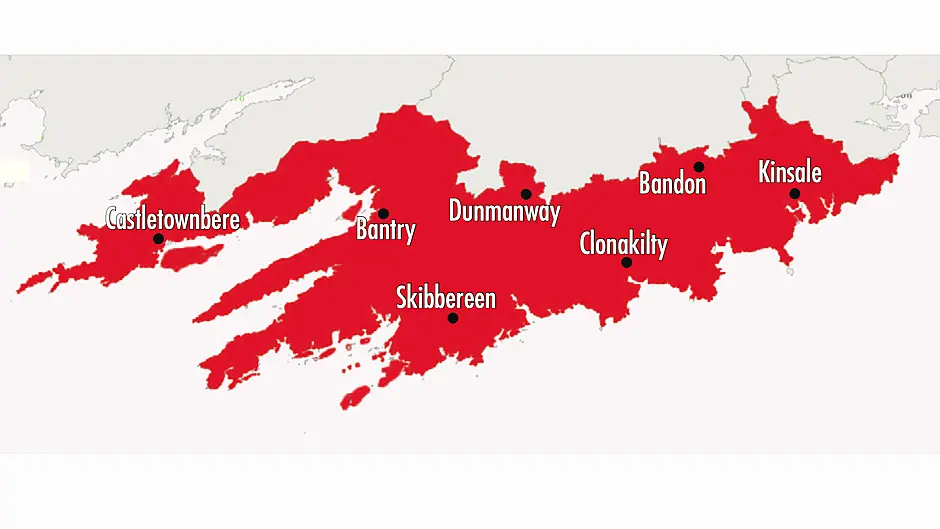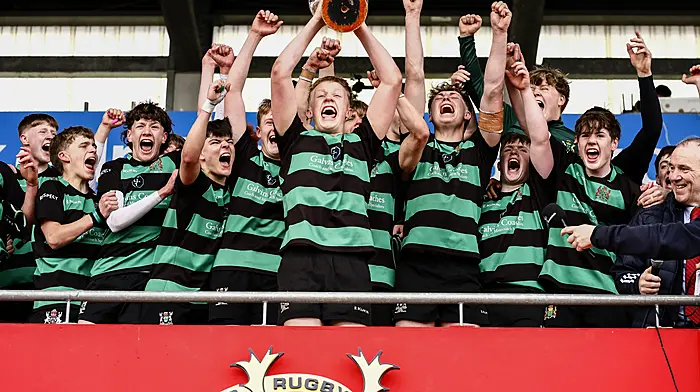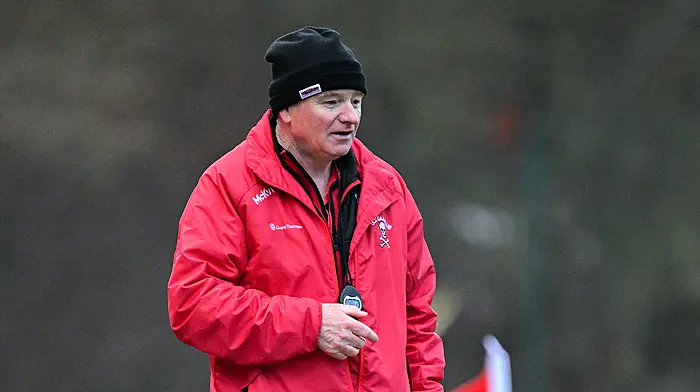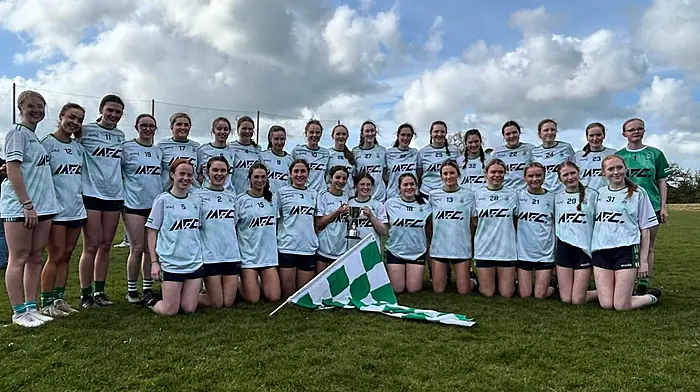CONSTITUENCY PROFILE: CORK SOUTH WEST

THERE’S no such thing as a slam dunk in Irish elections but with just three weeks left to canvass, the three sitting TDs in Cork South West clearly have the advantage.
In this constituency, which covers all of West Cork, there are, so far, nine candidates vying for three seats.
They include the three sitting TDs of Michael Collins (Ind Ire), Christopher O’Sullivan (FF) and Holly Cairns (SD), as well as Senator Tim Lombard (FG), Cllr Noel O’Donovan (FG), Cllr Alan Coleman (Ind), Evie Nevin (Lab), Claire O’Callaghan (Sinn Féin), and Deborah O’Driscoll (The Irish
People).
Polling in the June local elections shows that Michael Collins, as the leader of Independent Ireland, and Holly Cairns, as the leader of the Social Democrats, held sway in getting their candidates elected. That reflects well on them and their polling power in the upcoming general election.
Michael Collins, the most westerly candidate, in Schull, is expected to top the poll after the votes are counted on Saturday November 30th, while Holly Cairns of Church Cross in Skibbereen is said to be well-placed to take the second seat.
As the grains of sand rapidly run through the hourglass, the third sitting TD in CSW, Fianna Fáil’s Christopher O’Sullivan, who is located in Clonakilty, the middle of the constituency, could also retain the seat he won in 2020.
There are, however, others who say that Cork South West has gone from being one of the most predictable seats in the country to one of the most changeable. That claim is based on the fact that the last time this constituency re-elected all of its three sitting TDs was 27 years ago in 1997.
The electorate in CSW has voted for a change in every one of the last five elections, including 2002, 2007, 2011, 2016 and 2020.
Some pundits believe that adding the Fine Gael Cllr Noel O’Donovan to the party ticket, alongside Senator Tim Lombard, could produce the wrinkle in time needed to change the line-up of the next Dáil.
One scenario would see Noel O’Donovan usurp his running mate, the Bandon-based senator, who was elected to the Seanad in 2016, but lost to Holly Cairns when he attempted to take a Dáil seat in 2020.
Another scenario supposes that Fine Gael’s two-man tag team would see Tim Lombard prevail with O’Donovan’s transfers bringing him across the line – the theory being that Fine Gael would win back its seat at Fianna Fáil’s expense.
In either scenario, the question is: Which one of them is likely to be favoured by the Cork South West electorate?
Will it be Cllr Noel O’Donovan, who was first co-opted to replace Jim Daly in 2011, before being elected in 2014. He resigned his seat in January 2017 to become a member of An Garda Siochana only to make a triumphant return to local government in the June elections.
Or will it be Tim Lombard, who has loaded his bases by securing the nomination of his party colleagues – Cllr Marie O’Sullivan in the east of the constituency and Cllr Caroline Cronin in the West. It is also to his advantage that he is standing in a densely populated area, rich with votes.
Rough estimations per population centres show that Bandon is the biggest, with about 8,000 votes, while Kinsale is the second biggest with 6,900. Clonakilty in the constituency centre has 5,600, while Skibbereen has 2,800, Bantry 2,600 and Dunmanway 1,600.
For almost six decades, Fine Gael held two seats in Cork South West and Fianna Fáil had one. But their fortunes were reversed in 2002 when Bantry-based solicitor Denis O’Donovan defeated PJ Sheehan (FG) to take a second seat for Fianna Fáil alongside Joe Walsh.
Five years ago, the fraying edges of what was considered to be Fine Gael’s legendary and predictable vote management system collapsed when Holly Cairns (SD) beat the sitting Senator Lombard (FG) to take the third seat.
Five years on, pundits believe the transfer of second and third preference votes, along traditional party lines, will drop to about 50%, or lower, instead of the 80% they had come to rely on.
Of course, all of this is predicated on Fianna Fáil moving to strongly defend its seat in Clonakilty, the heart of the constituency.
But if Fianna Fáil is, as is widely speculated, riven by having two separate camps, Christopher O’Sullivan might not be able to rely on the traditional party vote to its fullest extent.
The Fianna Fáil executive’s decision to adopt a one-candidate strategy to maximise the vote could be to Christopher O’Sullivan’s, and the party’s, advantage.
Whatever about the battle for the third seat, pundits say that Michael Collins is high in the polls due to his ‘Belfast or Blind’ sight-saving cataract service, even if some constituents find his calls for immigration control policies, and a more measured approach to climate control,
unpalatable.
Holly Cairns is considered to be a polished and prolific performer. Her outspoken and well-researched contributions in the Dáil has given her a very high profile at national level, but she will need goodwill and support in her local, less densely populated, rural base, if she is to retain her seat.
Political loyalty has not gone completely out the window, but voting patterns are changing and it now seems to be the turn of the independents.
That seems especially true of the Independent Ireland Party, which has two of Michael’s brothers in local government – namely Danny Collins in Bantry and John Collins in Bandon – as well as Cllr Daniel Sexton (Ind Ire) in Skibbereen.
With such a broad base and an increasingly floating vote, the party is hoping to secure enough seats nationally to be able to bargain hard, reminiscent of the days of Jackie Healy-Rae.
Cllr Alan Coleman (Ind) ran a very high-profile campaign in the 2016 general election, and stood again in 2020, when he got a first preference vote of 1,801 and didn’t make the impact that he was hoping for.
Alan Coleman is banking on his poll-topping performance – with 2,511 first preference votes in the June local elections – boosting his chances this time around.
Meanwhile, Labour’s Evie Nevin, who is based in Clonakilty, is considered to be earnest and hardworking. But given her low polling – at 450 first preference votes – in the June local elections, and the brevity of this general election campaign, she is not expected to make a significant impact.
With so many ways for this particular cookie to crumble, it has yet to be established if Cork South West will indeed be a slam dunk.
